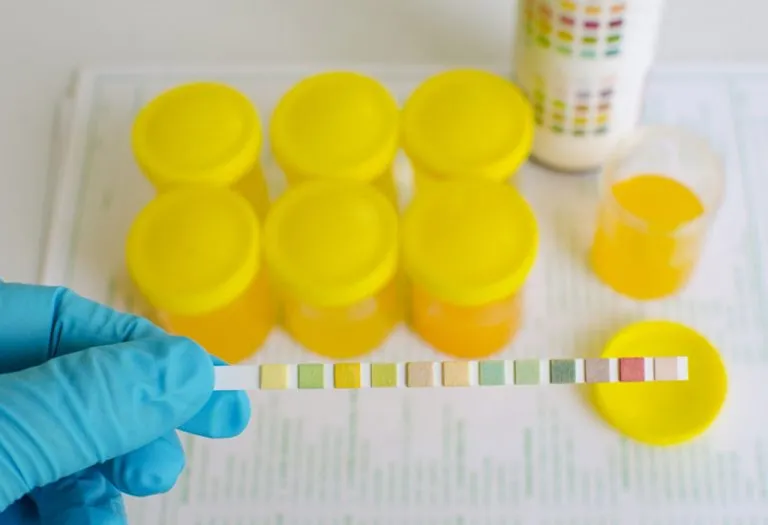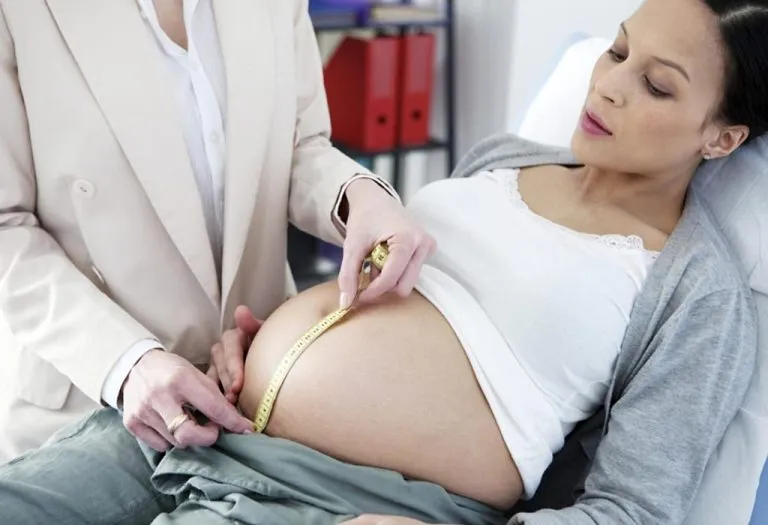Protein in Urine During Pregnancy – Causes, Risks, and Treatment
Learn what causes protein in urine during pregnancy, the risks it signals, and the steps to ensure you and your baby stay safe.
Pregnancy is a transformative journey marked by both joy and physical transformations. Beyond the visible changes like a growing belly, hormonal fluctuations can lead to unexpected shifts in mood and energy levels. Embracing these variations as part of the natural process is crucial for mental well-being. As the body adapts to nurture a developing life, it experiences increased blood volume, impacting circulation. This may manifest as swelling in extremities, a common occurrence often alleviated by rest and elevation. Staying informed about these changes fosters a proactive approach to self-care. In some cases, women may also notice high protein in urine while pregnant, which can indicate how the body is responding to these internal adjustments. Read on to know all about protein in urine during pregnancy- one of the many changes that occur in pregnancy.
What Does Proteinuria in Pregnancy Mean?
During pregnancy, it is normal for the urine to contain traces of protein. However, an increased rate of protein discharge can be an indication of kidney dysfunction or stress and infection in the body.
Proteinuria is a condition where an excess amount of protein is discharged in urine and a loss of more than 300 mg protein is a sign of the condition (1). Urinalysis is the test which is performed to analyse urine constituents (2).
Types of Proteinuria
Protein trace in urine isn’t always the same for every pregnant woman, and it can appear in different forms. Here are the main types you should know about (3).
1. Chronic Proteinuria
This is a condition which is present even before the pregnancy. Chronic proteinuria results from a pre-existing kidney problem.
2. Onset Proteinuria
Onset proteinuria develops during pregnancy and not before. It is mostly caused due to a condition called preeclampsia which is also a pregnancy disorder characterised by an onset of high blood pressure and impact on body organs.
Why Do You Need to Test for Protein in Urine During Pregnancy?
A test for protein in pee in pregnancy is important as it helps to determine and investigate any damage to the kidney or other complications which may have arisen during the pregnancy. Discharge of protein can be an indication of a more serious problem and hence diagnosing the presence of protein in urine is important.
Causes of Protein in Urine When Pregnant
Protein in the urine during pregnancy can happen for many reasons, and not all of them are serious. The following are a few common reasons for protein in urine during pregnancy:
1. Preeclampsia
Under this condition, proteinuria occurs after twenty weeks of being pregnant. Symptoms of preeclampsia include hypertension and high blood pressure, headaches, vomiting, abdominal pain, and blurring of vision in case of severe preeclampsia (4).
2. Eclampsia
Accompanied by seizures along with preeclampsia, eclampsia is an obstetrical emergency that warrants immediate medical attention (5).
3. HELLP Syndrome
The HELLP syndrome (where HELLP stands for Hemolysis, Elevated Liver enzymes, and Low Platelet count) is associated with preeclampsia and has similar symptoms. It is a life-threatening pregnancy condition and one of the reasons that can cause the discharge of protein in the urine (6).
4. Infection in Kidney or Urinary Tract
An infection of the kidney or urinary tract may also cause loss of protein in the urine. It is important to check the symptoms for this condition and consult your doctor for remediation (7).
5. Other Factors
Conditions such as dehydration, excess stress, arthritis and diabetes can also result in a discharge of protein in the urine during pregnancy (3).
Risk Factors for High Protein in Urine in Pregnancy
Understanding the risk factors associated with high protein in urine in early pregnancy is essential for timely intervention and effective management.
- Previous occurrences of preeclampsia in personal or family history.
- Giving birth multiple times (multiparity).
- Having a body mass index (BMI) exceeding 30 (obesity).
- Being 35 years old or older.
- Presence of health conditions like chronic hypertension or diabetes (type 1 or type 2).
Signs of Protein in Urine During Pregnancy
The following symptoms can be an indication of protein discharge in urine (7):
- Swelling of hands and feet
- Face swelling
- Foamy urine
- High blood pressure
- Reduced urine output
- Persistent headaches
- Abdominal pain or discomfort
- Visual disturbances, such as blurred vision
- Fatigue or generalised weakness
- Sudden weight gain
Diagnosis and Tests
The following are the tests performed to detect levels of protein in urine:
1. The Dipstick Test
In this test, a strip with chemically treated patches is dipped into the urine sample, which changes colour in case of presence of protein. The reading from this test ranges from + to ++++ with 4 ‘+’ indicating high protein in the urine, which is an indication of preeclampsia or damage to the kidney (8).
2. 24-Hour Urine Protein Test
In this test, urine samples are collected over 24 hours in separate containers and sent for analysis. Usually, the first urine in the morning is not considered for test purposes. If the protein content in urine is greater than 300 mg, it is an indication of preeclampsia (9).
3. Blood Pressure Monitoring
Regular blood pressure checks are essential, as elevated blood pressure can accompany proteinuria and may indicate conditions like preeclampsia.
4. Spot Urine Protein-to-Creatinine Ratio
This test measures the ratio of protein to creatinine in a single urine sample, offering a quick assessment of protein levels. It aids in the diagnosis and monitoring of proteinuria during pregnancy (10).
Below is a protein levels in urine chart for pregnancy, showing different test types along with their normal and pregnancy values.
| Type of test | Urine protein (normal) | Urine protein (pregnancy) |
| 24 hours | 10-140 mg | <300 mg |
| Spot urine | 10-14 mg/L | <300 mg/L |
| Spot urine dipstick | Negative | Negative or Trace |
Complications
Discharge of protein in the urine during pregnancy can be a sign of serious problems in the body. Following are the possible complications which are associated with proteinuria:
- Urinary tract infection
- Preeclampsia
- HELLP syndrome
- Higher stress levels
- Frequent fever and dehydration
- Pulmonary oedema due to overflow of fluids
- Acute renal failure
- Increased risk of infection from bacteria
- Possibility of suffering from ailments such as heart problems, kidney infection, diabetes, leukaemia, arthritis, and anaemia.
Treatment for Protein in Urine During Pregnancy
Passage of high protein in the urine during pregnancy is not a disease in itself and hence there is no treatment for it. The key here is to find the root cause of the increased protein discharge and to take corrective action against the problem (11).
In order to understand how to reduce protein in the urine during pregnancy, it is necessary to diagnose the real reason behind it. For instance, if the reason for protein discharge is diabetes, then you will have to control it by exercising, taking necessary medication and eating the right food. If the cause of proteinuria is hypertension, you will have to get treated for hypertension in order to treat the condition.
Prevention of High Protein in Urine While Pregnant
Ensuring a healthy and smooth pregnancy involves proactive measures to prevent complications, including the occurrence of high protein levels in urine. By adopting certain lifestyle choices and seeking regular prenatal care, expectant mothers can contribute to a safer and more comfortable pregnancy experience.
- Stay Hydrated: Drinking an ample amount of water helps maintain proper kidney function and dilutes urine, reducing the risk of concentrated proteins.
- Balanced Diet: Embrace a diet rich in fruits, vegetables, and lean proteins. This promotes overall health and supports proper kidney function.
- Regular Exercise: Engaging in safe and moderate physical activity improves circulation, reducing the likelihood of conditions leading to proteinuria.
- Manage Blood Pressure: Regular monitoring and management of blood pressure contribute to a healthier cardiovascular system, minimising the risk of protein in urine.
- Control Blood Sugar Levels: For individuals with diabetes, proper management of blood sugar levels is crucial in preventing complications, including proteinuria.
- Limit Salt Intake: Excessive salt consumption can contribute to high blood pressure, which is a risk factor for protein in urine. A balanced approach to salt intake is advisable.
- Prenatal Care: Regular check-ups with healthcare professionals allow for the early detection and management of potential risk factors, reducing the likelihood of proteinuria.
When to Consult the Doctor?
Should you sense any concerns, it is crucial to promptly communicate with your healthcare provider. Recognising various signs and symptoms related to the presence of protein in urine during pregnancy is essential. The majority of these indications are commonly linked to the development of preeclampsia, which is typically the primary concern requiring attention (11).
FAQs
1. Will high protein in urine affect your baby?
Yes, high protein in a pregnant woman’s urine can potentially affect the baby. It may indicate conditions such as preeclampsia, which can lead to complications for both the mother and the baby. Monitoring and managing protein levels are crucial to ensure a healthier pregnancy outcome. Always consult with your healthcare provider for personalised information and guidance.
2. Is protein in urine dangerous in the third trimester?
It can be, depending on the amount. Mild levels of protein in urine during pregnancy third trimester may be normal, but higher levels, especially with symptoms, require medical attention to rule out preeclampsia.
3. Can dehydration cause bubbles in urine during pregnancy?
Yes, dehydration can make urine more concentrated, which can lead to bubbly or foamy urine. Drinking enough water usually helps reduce this.
Discharge of protein in the urine during pregnancy can be a serious condition which is not to be taken lightly. On noticing any symptoms of proteinuria or protein in pee in pregnancy, it is important to consult a doctor immediately and get yourself tested for the condition. Timely identification of the underlying disease and taking corrective action will help you restrict any further damage from the underlying disease or ailment.
Also Read:
Urine Colour in Pregnancy
Smelly Urine when Pregnant
Urine Leakage during Pregnancy
Leukocytes in Urine during Pregnancy
Was This Article Helpful?
Parenting is a huge responsibility, for you as a caregiver, but also for us as a parenting content platform. We understand that and take our responsibility of creating credible content seriously. FirstCry Parenting articles are written and published only after extensive research using factually sound references to deliver quality content that is accurate, validated by experts, and completely reliable. To understand how we go about creating content that is credible, read our editorial policy here.
1. Cleveland Clinic – Protein in Urine (Proteinuria)
2. Cleveland Clinic – Urinalysis
3. National Library of Medicine – Proteinuria
4. Cleveland Clinic – Preeclampsia
5. Cleveland Clinic – Eclampsia
6. Cleveland Clinic – HELLP Syndrome
7. American Kidney Fund – Protein in urine (Proteinuria) symptoms, causes, tests and treatments
8. Nemours KidsHealth – Urine Dipstick Test (Dipstick Urinalysis)
9. Cleveland Clinic – 24-Hour Urine Test
10. Cleveland Clinic – Urine Protein Creatinine Ratio
11. The Johns Hopkins Medicine – Proteinuria





































